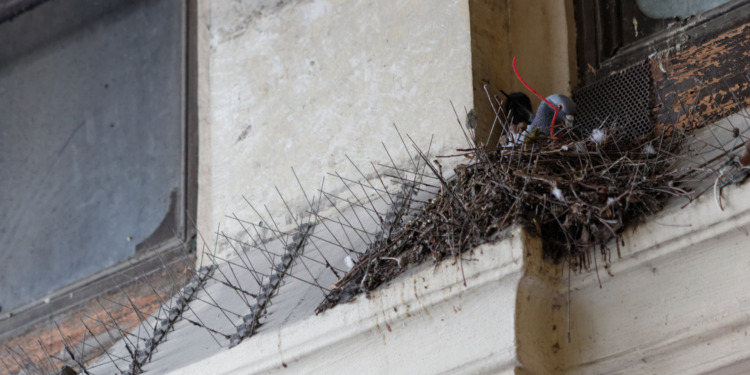It has long been observed by naturalists that many animals use man-made objects in a variety of ways. Examples are elephants dropping logs on electric fences to short them or squirrels in Manhattan using power lines to safely cross over roads. But recent sightings of crows and magpies using anti-bird spikes to keep birds away from their nest to protect their young have sparked great interest.
Initially observed in Rotterdam, the spottings were thought to be an isolated or perhaps a one-off, but further sightings have now been reported in many other separate and unconnected areas, such as Glasgow in Scotland.
And it’s not simply one type of man-made object that has been used: nails, screws and other bizarre items have also been found. In one area of Canada, a pigeon was seen building its home from used drug syringes.
However, this latest finding takes the interesting twist that the use of metal spikes on buildings is actually intended to stop them from being there in the first place.
The phenomena of animals changing the human environment can be observed in other areas too. Both Canadian Geese and certain types of deer have not only adapted but thrived in urban areas. Scientists have also reported Orangutans using logging routes as makeshift roads.
Related Articles: Are the Orca Boat ‘Attacks’ Purposeful or Just Playful? | Not a Conservation Success: Macaque Monkeys, No Longer an Endangered Species, Attack Humans in Japan
So apart from the initial shock and curiosity over these birds using sharp man-made objects like anti-bird spikes to improve their nests, why is this causing such interest?
The answer seems to lie in the fact that as humans can and have, in many cases, ruined their natural environment, animals in all corners of the world seem to be adapting to it. A quote from Ayn Rand, the Russian-born writer and philosopher, and author of the respected work, “Atlas Shrugged” can shed light on this:
“The difference between animals and humans is that animals change themselves for the environment, but humans change the environment for themselves.”
The phenomena of birds using man-made items – even items that were intended to deter them – could be seen to illustrate the ideas of thinkers such as Darwin or Rand.
Our environment, whether we acknowledge it or not, is set to rapidly change due to our actions and the way our society works. Climate change, increasing urban sprawl encroaching onto natural or farming land, and the pollution of our seas are all examples.
As humans, we often see our intelligence as what separates us and makes us stand out as a species. Yet, as Charles Darwin outlined:
“It is not the most intellectual of the species that survives; it is not the strongest that survives; but the species that is best able to adapt and adjust to the changing environment in which it finds itself.”
Editor’s Note: The opinions expressed here by the authors are their own, not those of Impakter.com — In the Featured Photo: Bird nests made of anti-bird spikes. Featured Photo Credit: Wikimedia Commons.










